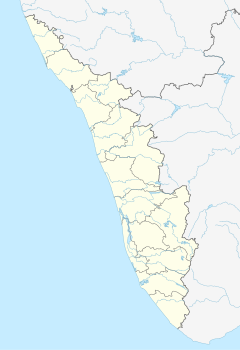Attingal Palace
Script error: No such module "Draft topics".
Script error: No such module "AfC topic".
| Attingal Palace | |
|---|---|
| Alternative names | Koyikkal Kottaram |
| General information | |
| Location | Attingal |
| Town or city | Attingal |
| Country | India |
| Coordinates | 8°41′27″N 76°48′13″E / 8.6908°N 76.8035°E ⧼validator-fatal-error⧽ |
| Current tenants | Government of Kerala |
| Designations | Royal Seat of the Queens of Travancore |
Attingal Palace, also known as Koyikkal Kottaram is a historical royal palace located in Attingal, Kerala, India. The Attingal palaces (Manomohanavilasom and Koyikkal) are mentioned in literature dating from 1305 A.D.
History[edit]
The Attingal Palace had an important role in the history of Kerala. It played a significant role in the growth of the Travancore Dynasty.
The Attingal Palace gained prominence in the 14th century when Udaya Marthanda Varma ascended the throne of Travancore. He adopted two princesses from the royal family of the Kolathiris of North Malabar. A palace for each one of them was built by the king at Attingal and Kunnummel.
The palace witnessed the first-ever united rebellion against the British.
The walls of the palace are adorned with murals.[1]
In 1721, the palace was the site of the Attingal Outbreak against the malpractice of British traders – in this case, it was triggered by the pricing of black pepper. Locals attacked British officers heading to the palace to give gifts to the queen, before capturing the nearby Anchuthengu Fort. Six months later, the British reclaimed the fort but shortly afterward signed a peace treaty with the queen of Attingal.
Recent[edit]
Today, the palace houses a Folklore Museum (1992) and Numismatic Museum, both of which house objects of cultural significance within the Kerala State. The Numismatics Museum has a rare coin collection. The main edifice of the palace is now under the control of the Devaswom Board.
In October 2020, it was announced that the palace would undergo a multi-million rupee renovation. The surrounding area contains several temples, many of which were built by the local rulers. A number of these temples are located close to Attingal Palace.[2]
See also[edit]
References[edit]
External links[edit]
| Wikimedia Commons has media related to Attingal Palace. |
This article "Attingal Palace" is from Wikipedia. The list of its authors can be seen in its historical and/or the page Edithistory:Attingal Palace. Articles copied from Draft Namespace on Wikipedia could be seen on the Draft Namespace of Wikipedia and not main one.

